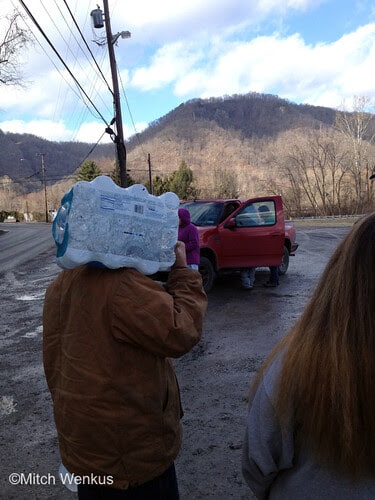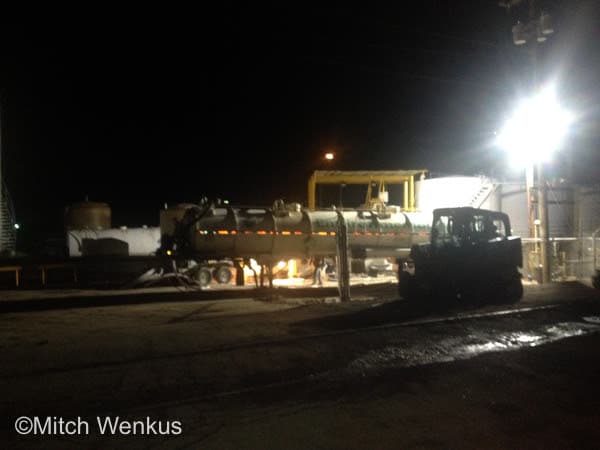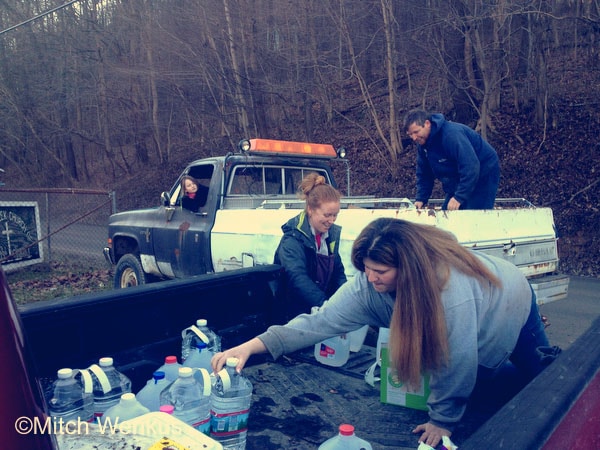This is a guest post by Jesse Coleman, cross-posted from Greenpeace USA blogs.
On January 9th, Freedom Industries, a company that stores chemicals for the coal industry, spilled 7,500 gallons of crude Methylcyclohexanemethanol (MCHM), a little known, little understood compound into the Elk river. The spill occurred one mile upriver from the water intake that supplies tap water for all of West Virginia’s capital city of Charleston.
The thick oily chemical was pumped through the water system and into homes and businesses throughout the area, causing vomiting, skin problems, and diarrhea. Now, nearly two weeks since the disaster was discovered, the water has been deemed “safe to drink,” though water from the tap still releases a sickly sweet chemical odor, especially when heated.
Pregnant women and children are still advised to drink bottled water, but very few people in the affected area are interested in drinking from the tap, with child or not. The tremendous need for potable water has led to the creation of the West Virginia Clean Water Hub, a community led effort to provide the people of Charleston and the outlying areas with bottled water, a need that government agencies have largely ignored. Sign this petition to demand justice for people whose water has been poisoned.
So little is known about 4-MCHM that regulators didn’t even know it’s boiling point. Now scientists are scrambling to find out how the chemical reacts with the chlorine in the municipal water system, and whether the chemical has leached into water heaters and water pipes in people’s homes. Authorities recommend that all pipes that have come in contact with the pollutant be flushed, including water heaters and outdoor faucets. However, West Virginia American Water, the company that owns the water treatment facility contaminated by the coal chemical, is only offering a 10 dollar credit (1000 gallons) to consumers. The cost of flushing homes will therefore fall on already struggling West Virginians, where poverty is rampant and Walmart is the largest single employer.

The affected intake also supplies water to 9 counties surrounding Charleston, which contain multiple rural communities, like the small community of Pratt. Pratt was added to Charleston’s municipal water system only two months ago. This was initially celebrated by the residents of Pratt, because it meant relief from the extremely poor quality water from local sources, which have been contaminated by Acid Mine Drainage, coal dust, and othercoal industry impacts.
Water contamination from the coal industry is nothing new to West Virginians, who have lived with poisoned wells streams for generations. This spill, the latest and most dramatic in a long history of water contamination, exposes the problems of lax and inadequate regulation coupled with politicians that prioritizes the bottom line of the coal industry over the health and safety of people. The chemical 4-MCHM was exempted from federal laws that require disclosure. The tanks that held the chemical were not required to be inspected regularly, due to a loophole that exempted above ground tanks from inspection.

Crews continue to work on the site of contamination at Freedom Industries.
West Virginian politicians with close ties to the coal industry have continued to defend coal companies from federal and state regulation, even as 300,000 of their constituents went without drinkable water. Speaking at an event hosted by the coal front group American Coalition for Clean Coal Electricity (ACCCE) last week, Joe Manchin, West Virginia’s junior senator and former governor continued to defend the coal industry from reglation. “Coal and chemicals inevitably bring risk — but that doesn’t mean they should be shut down,” said Manchin. “Cicero says, ‘To err is human.’ But you’re going to stop living because you’re afraid of making a mistake?” Manchin has significant financial ties to the coal industry.
The current governor of Wet Virginia, Earl Ray Tomblin, was also quick to defend the coal industry. In a press conference days after the spill, he said ““This was not a coal company. This was a chemical supplier where the leak occurred. As far as I know, there are no coal mines within miles of this particular incident.” Governor Tomblin’s remarks ignore the fact that many communities affected by this spill are only using municipal water because local sources have already been poisoned by coal extraction and use. Tomblin also ignored the fact that Freedom Industries’ product is a necessary part of the coal extraction and burning process.
To donate water to West Virginians, please visit the Keeper of the Mountain Foundation.
To volunteer or request clean water, visit the West Virginia Clean Water Hub.
Subscribe to our newsletter
Stay up to date with DeSmog news and alerts






